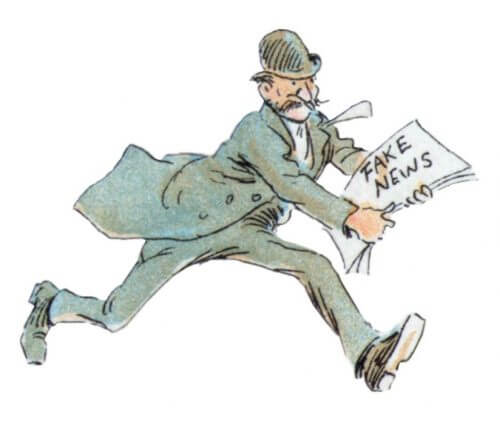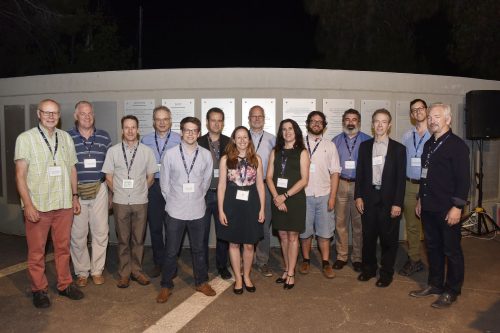An international research workshop of the Israel Science Foundation, held at the Technion, examined the public's involvement in science on social networks, the phenomenon of fake news and ways to deal with it

Is Fake News in the fields of science and health a new phenomenon? Should the scientists organize and fight it and if so, how? What should the education system teach about science to help the citizens of the future cope with the abundance of online information about science and health?
These and other questions were discussed by 11 of the world's top researchers in the fields of science communication and science education as part of WEIGHT 2017 - A research workshop of the Israel Science Foundation held at the Technion.
The workshop, which focused on "public involvement in science on social networks", was opened by Prof. Dominique Broussard from the University of Wisconsin-Madison. Prof. Broussard, who was elected a few weeks ago as an honorary fellow in the most important organization in the field of communication research (ICA), pointed out the rapid changes taking place in the ways in which the public is exposed to scientific information. These changes, according to her, require scientific institutions and policy makers to develop and adapt themselves to the changing reality. Thus, for example, new technologies for genome editing (such as CRISPR-Cas9) raise ethical, legal and social issues and require not only the updating of the public but also its participation in determining the policy for their use. Prof. Broussard pointed out that although the accessibility of science is becoming more and more challenging in view of the decreasing number of science writers, social networks open up new opportunities for communication with the public.

"The education system also needs to adapt to the new reality," said Prof. Jonathan Osborne from Stanford University, one of the world's leading researchers in the field of science education. Prof. Osborne pointed out some misconceptions about science that have taken root in the public despite the efforts of the education systems - and maybe even because of them. "Citizens of the future must understand that there is not one 'scientific method' but a variety of ways of scientific thinking, that science develops and changes constantly and that mistakes are common in science," he said. He suggested emphasizing contemporary science alongside ancient science, failures in science alongside successes and peer review as one of the most important tools of the scientific community to prevent errors from taking root. According to him, peer review is emphasized only in the UK in the science curriculum, and it is appropriate that this emphasis be incorporated into the curricula in other countries.
And what about "fake news"? Among the speakers, there was a consensus that biased or misleading coverage has always existed in the science media, and that there is no evidence of an increase in the phenomenon of deliberate deception on science issues. Prof. Broussard pointed out that recently sophisticated mechanisms have been developed, also in social networks, that curb the spread of false information. Prof. Lloyd Davis from the University of Otago, New Zealand, agreed with her and said that it is better to strengthen the reliable and accurate scientific coverage instead of trying to fight "fake news" in an organized manner, which is doubtful to be a real problem in the field of science today.
The PESO 2017 research workshop was organized by the science communication group from the Faculty of Science and Technology Education at the Technion, led by Prof. Eilat Baram-Zabari. It was held with the generous support of the National Science Foundation, the Technion President's Fund, the Municipality of Haifa, the Ministry of Science and Technology, the Ruth and Ellen Ziegler Center for Learning Sciences at the Faculty of Science and Technology Education at the Technion, the Moshe Yanai Foundation for Fostering International Science Relations (exact sciences and technology) and the Centers of Excellence program (I -CORE) of the National Science Foundation and the Planning and Budgeting Committee of the Higher Education Council.

7 תגובות
If there was no religious fervor there would be no Inquisition and no anti-Semitism and no Islamic terrorism...
How John Lennon sang:
Imagine there's no countries
It isn't hard to do
Nothing to kill or die for
And no religion too
Imagine all the people
Living life in peace ...
my father
I also got carried away on a personal level and I apologize for that.
I understand that you hate everything that happens to you with "religious zeal" but think about it that without those people, people with "religious" zeal, there would be no changes in the world, nor would there have been a state. It's true that not all the work was done by people with "religious" zeal and an important part is also people who make small changes in their lives like you in reducing meat eating or like me (I'm really not as extreme as you might think, for dogma I still eat eggs even though I don't think it's moral or healthy , simply because it's still hard for me to stop). But really big changes like women's suffrage, the end of slavery, and also revolutions that still have to be like a transition of the world to a sustainable life, will not happen without people with religious zeal.
No
I don't like to comment on a person's body, even if it is anonymous.
In the previous message I got a little carried away with the personal tone - and I apologize for that.
No
I never wrote what you claim.
I never claimed that there is no greenhouse effect - on the contrary.
I never wrote that vegetarianism is more polluting - only that there are also such claims.
I just stated that such opinions exist, and that I read such articles, and in the passage I wrote that I do not take a position for or against.
But for people who are dark fundamentalists, who are stuck in their positions, any mention of the existence of an opinion different from theirs makes the fuses jump.
And there is a lot of fake news that is spread on both sides and a lot (if not most) of the fake news is spread precisely by your friends - vegetarian interests and those who want to promote the political and commercial agendas related to the Kyoto and Paris agreements.
my father
You are right in what you wrote.
But it's strange to hear it from you, because you are one of the main spreaders of fake news on this site.
(There is no greenhouse effect, vegetarianism pollutes more than eating meat and more and more...)
The Internet is full of scientific "fake news" that is distributed by Internet users, and also distributes emails that run on the Internet containing fabricated and unreliable information.
Another problem is that real scientific articles and experiments/observations that are published in the scientific press are also distributed by interested parties who take them and disconnect them from the statistical data, and from other studies that cast doubt on them, interpret them as they see fit, and present them as proven scientific facts beyond any doubt in order to promote what that they want to promote.
There are entire newspapers that are one big FAKE NEWS such as Hadar Strimmer Haaretz and the New York Times and the Washington Post. Because in general the left is unable to deal with facts and logic, so it distorts or writes parts of the truth or only one side (of the Ishmaelites) to promote the agenda of its owners and supporters